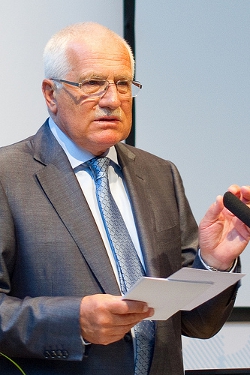Chris Gilson and Stuart A Brown take a look at the week in Brussels blogging.
The EU centre
Craig Willy looks at the ability of the European Central Bank to compel national governments to obey its will, and wonders whether or not it was a good idea to give so much power to one, unaccountable, institution.
Robert Zbíral at the Verfassungsblog writes on the legal debate over whether the European Court of Justice should have superiority over national courts. While this principle has existed for decades, it was recently challenged again in the Czech Republic’s Constitutional Court.

It was an interesting week for the UK’s relationship with the EU, with critiques from the administration of US President Obama over the possibility of the UK leaving the EU. The week also saw Prime Minister David Cameron’s threat to alter its EU treaties to loosen social laws like the Working Time Directive, according to Lost in EUrope, as well as a ‘bland’ section on Europe in the UK coalition government’s mid-term review, according to Open Europe. Meanwhile, Jon Worth criticises the United Kingdom Independence Party after they dismissed the leader of their youth organisation for making statements in favour of gay marriage.
EU Foreign policy and the European neighbourhood
Luis Simón at European Geostrategy writes on France’s changing position in the world of foreign policy. He argues that the country has shifted its focus away from Europe and bilateral agreements with Germany, to a more ‘Atlantic’ position through specific alliances with the United Kingdom and United States.
Contentious Politics Russia says that any future falls in the price of oil could cause serious headaches for Vladimir Putin.
Looking at the EU’s relationship with China, the Centre for European Reform blog says that countries could take a more strategic approach, by pooling their efforts through the EU, rather than viewing themselves as competitors.
The Euro Crisis
Jonathan Portes at Not the Treasury View asks whether immigration might be used as a growth strategy. Although public opinion tends to favour reducing the number of migrants entering a country during a period of economic crisis, he argues that immigration can be linked to a number of positive factors that could provide a boost to struggling economies.
Open Europe writes on the eurozone unemployment figures released this week. Among other points, they highlight in particular the huge divergence in unemployment between different eurozone countries. While only 4.5 per cent of people are unemployed in Austria, the figure in Spain is 26.6 per cent.
Across Europe
The Czech Republic holds the first round of its Presidential election this week. Dr Sean’s Diary has a discussion of the political return of Miloš Zeman to Czech politics. The former leader of the Social Democrats has emerged as the leading candidate to take over from Václav Klaus as President.
On her blog, Romanian MEP Corina Cretu condemns recent comments by Romanian MEP, László Tőkés calling for more autonomy for the country’s Hungarian community, saying that Romania now needs greater solidarity and dialogue to close the wounds of the last political year. Mary Barr, writing at the GMF blog, takes a slightly different line on Romania. She argues that although the country’s political system has recently been heavily criticised, the story of Romania’s transition to democracy in the past 20 years actually provides positive inspiration for other countries across the world.
Croatia, the war, and the future looks at the Croatian government’s heavy-handed approach to debt collection, with the creation of over 220,000 special bank accounts to hold parts of people’s wages and pensions in order to gradually pay off their debts.
Previewing elections in Italy next month, Open Europe reckons that the candidacy of Mario Monti might turn out to be more divisive than previously thought, with Italian voters showing little warmth towards his reformist message.
And finally…
What has President of the European Council, Herman van Rompuy been up to? This week he met with the President of Slovenia, Borut Pahor, and visited Ireland.
Jon Worth has some advice for Danish Prime Minister, Helle Thorning-Schmidt, should she wish to join Twitter (she is one of the 25 per cent of the world’s heads of state that has not).
Matthew Lowry at Blogactiv.eu looks at the possibility that Esperanto could become the language of the EU online public sphere. Ĝi estas interesa penso!
_________________________________
Please read our comments policy before commenting.
Note: This article gives the views of the author, and not the position of EUROPP – European Politics and Policy, nor of the London School of Economics.
Shortened URL for this post: http://bit.ly/VPJukC


